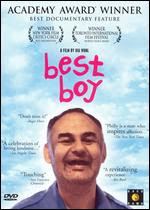
Let's save some agony and cut to the IMDB chase:
Portrait of a family in transition: a mother, a father, and their son, their "best boy." Pearl and Max Wohl live in Queens with Philly, their cheerful, engaging, and mentally-disabled son. For 50 years Pearl and Max have provided a loving home for Philly, but they're aging, Max is ailing, and they must figure out what's to happen to Philly when they can no longer care for him. Are there options besides an institution? Philly's cousin is Ira Wohl, whose camera follows the family as Philly takes steps into the wider world. Written by {jhailey@hotmail.com}
All this time while watching documentaries I felt a dissonance between what was going on behind the camera and what I was watching. I always felt the film crew looking on the people with impersonal voyeuristic intentions, even the do-no-wrongers, the Maysels. With films like American Movie, Speedo, and 
The intrafamilial relationships were the most interesting parts of Best Boy that explored the intricate workings of a family living day-to-day with a special needs child, even though Phillip cannot technically be referred to as child being in his 50s. His mother, Pearl, who eerily reminds me of my grandmother, exercises skillful and loving care of the family, even though she and Phillip’s father, Max, break their façade of unfettered elation in the presence of Phillip. During a moment when Ira and

I don’t want to talk about this film in terms of making you think about what we take for granted or to take away any moral, but rather to view this film as an example of the human condition (that’s right, I said it) and the way in which it can be respectfully and thoughtfully provoking without the harsh melodrama of self-aware nincompoops (don’t get me wrong, I love self-aware nincompoops, but sometimes I like to keep a classy base).
Aside from being a nice change from the other films I’ve been watching, Best Boy was just down right charming and heartwarming (although heartbreaking at the end). Phillip won me over. The moment he was singing “If I Were a Rich Man” with Zero Mostel and completely oblivious to any concept of celebrity was fantastic. There were rare moments when Phillip wasn’t smiling or oozing contentment. Is this starting to sound like a eulogy? He has a strong outgoing personality that really shines in Best Boy and I highly recommend viewing it. Amen.
Apparently you can watch the whole thing on YouTube.
